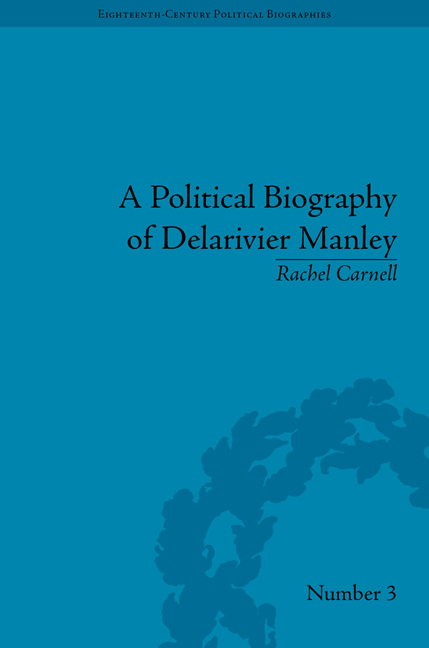Book contents
- Frontmatter
- CONTENTS
- The Author
- Dedication
- Acknowledgements
- A Note on Dates
- Manley Family Tree
- Introduction
- 1 ‘A Long Untainted Descent’: Her Father's Daughter?
- 2 Roger Manley: ‘A Scholar in the Midst of a Camp’
- 3 A ‘Liberal Education’: Youth and Early Life in London
- 4 A ‘Female Wit’: 1694–6
- 5 ‘Some More [and Less] Profitable Employ’: 1697–1705
- 6 Not Yet a Propaganda Writer: 1705–8
- 7 ‘[T]hrowing the First Stone’: 1709
- 8 Writing under a Tory Ministry: 1710–14
- 9 A Celebrated ‘Muse’: 1714–24
- Notes
- Works Cited
- Index
5 - ‘Some More [and Less] Profitable Employ’: 1697–1705
- Frontmatter
- CONTENTS
- The Author
- Dedication
- Acknowledgements
- A Note on Dates
- Manley Family Tree
- Introduction
- 1 ‘A Long Untainted Descent’: Her Father's Daughter?
- 2 Roger Manley: ‘A Scholar in the Midst of a Camp’
- 3 A ‘Liberal Education’: Youth and Early Life in London
- 4 A ‘Female Wit’: 1694–6
- 5 ‘Some More [and Less] Profitable Employ’: 1697–1705
- 6 Not Yet a Propaganda Writer: 1705–8
- 7 ‘[T]hrowing the First Stone’: 1709
- 8 Writing under a Tory Ministry: 1710–14
- 9 A Celebrated ‘Muse’: 1714–24
- Notes
- Works Cited
- Index
Summary
Having apparently lost interest in writing for the theatre and not having yet discovered a prose genre to which she wanted to devote her time, Delarivier Manley seems to have been amenable by late 1696 to other means of making a living. Manley does not tell us what she was doing after the spring theatre season of 1696 ended. By late 1696 or early 1697, however, Catharine Trotter apparently asked for Manley's help in influencing John Manley, who as an MP could interve to assist the incarcerated John Tilly. Tilly had been taken into the ‘Custody of a Sergeant at Arms’ for misdemeanours, presumably as part of the parliamentary inquiry into the management of the Fleet Prison, of which Tilly was warden.
Manley claims that at the time that Trotter made this request, she was living ‘in a pretty Retirement, some few Miles out of Town, where she diverted her self chiefly with walking and reading’, although she does not tell us how she was supporting herself at this time. We might guess that she was either living frugally on the amount she had earned from the author's benefit of The Royal Mischief, that she was receiving some maintenance stipend from John Manley, or that she was staying with a friend, or perhaps with her sister Cornelia.
When Trotter asked for Manley's help, Manley, according to her account in Rivella, immediately asked if Trotter and Tilly were lovers. Manley claims not to believe Trotter's denial, although such gossip would not be mentioned in The Female Wits, a production that seems to have exposed every known foible of the three women writing for the stage in 1696. The narrator of Rivella tells us that because Trotter claimed not to be Tilly's lover, Manley felt she could not trust Trotter's account of her situation and insisted on meeting with Tilly herself before committing to trying to help his case. Whether this was the real reason for her wanting to meet Tilly, or whether she had other motives, Manley explains that she went to meet Tilly, apparently carrying with her a copy of la Rochefoucauld's Moral Reflections to read while she waited for her audience with him.
- Type
- Chapter
- Information
- A Political Biography of Delarivier Manley , pp. 113 - 136Publisher: Pickering & ChattoFirst published in: 2014



